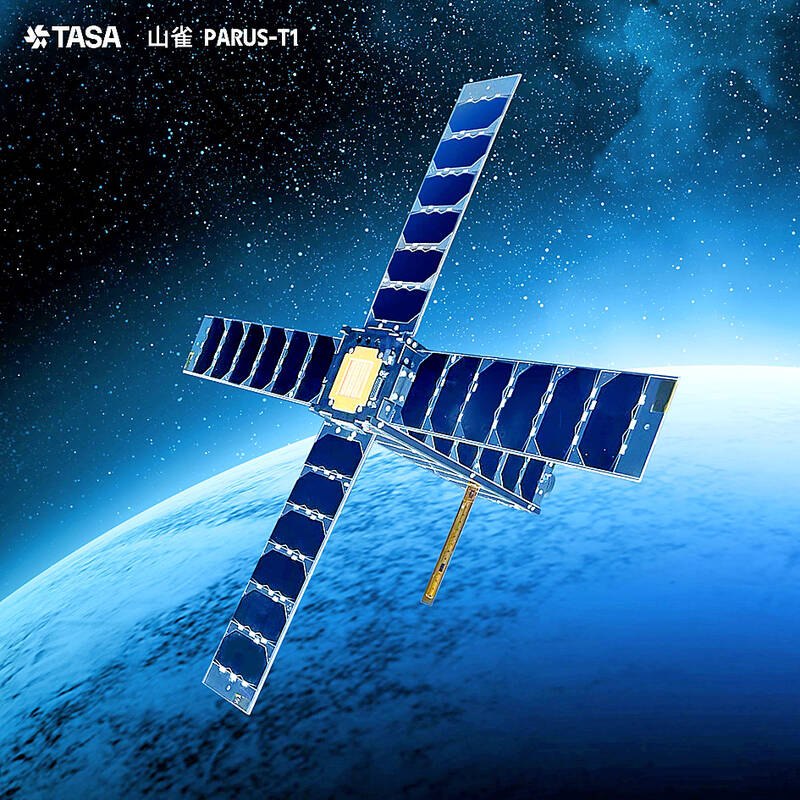Taiwan’s domestically developed PARUS-T1 satellite was launched into space yesterday on SpaceX’s Transporter-12 rocket from the US Vandenberg Space Force Base in California to begin its 12-month technological mission.
The rideshare mission was declared a success at 11:09am (7:05pm Pacific Standard Time on Tuesday), the Taiwan Space Agency (TASA) said.
The PARUS-T1 is a domestically designed, manufactured and integrated CubeSat-class 3U satellite launched to test the maturity of Taiwanese satellites, the agency said.

Photo courtesy of Taiwan Space Agency
It carried an experimental payload of telecommunications and systems to automatically identify ships.
The 3U-sized T1, T1A and T2 3U satellites and the 6U-sized T3 and T4 satellites share a common family of platforms developed under TASA’s PARUS program, it said.
Named after Sittiparus castaneoventris, a species of small birds endemic to Taiwan, the PARUS program’s aim is to develop compact and innovative satellite systems for the nation’s use, TASA said.
The SpaceX rocket deployed PARUS-T1 at an altitude of 515km in low Earth orbit 57 minutes after the launch, and the satellite deployed its solar panels and antenna 30 minutes after it entered orbit, it said.
PARUS-T1A, the PARUS T-1’s ill-lucked sibling, was lost in a failed launch of Space One’s KAIROS vehicle in Japan last month, TASA said.
Separately, the TASA and the Ministry of Environment yesterday unveiled a program to produce a constellation of air quality observation satellites to monitor air pollution over Taiwan, China and Southeast Asian nations.
The constellation would consist of four multispectral and hyperspectral device-equipped satellites to measure particulate matter smaller than 2.5 micrometers (PM2.5), carbon dioxide and methane concentrations, officials told a news conference in Taipei.
The NT$6.1 billion (US$184.49 million) research and development program — which is expected to put its first satellite in orbit in three years — is to be implemented from next year to 2031, the officials said.
In addition, the ministry is conducting a program to monitor air pollution over Kaohsiung and Pingtung County in collaboration with NASA and researchers from Taiwan and the US, they said.
The 3D air pollution monitoring program makes use of readings from ground-based stations, drones, aircraft and satellites to analyze the distribution of pollutants and improve predictive modeling, they said.
The ministry is also applying Internet of Things and generative artificial intelligence technologies to locate air pollution sources, they added.

CHAOS: Iranians took to the streets playing celebratory music after reports of Khamenei’s death on Saturday, while mourners also gathered in Tehran yesterday Iranian Supreme Leader Ayatollah Ali Khamenei was killed in a major attack on Iran launched by Israel and the US, throwing the future of the Islamic republic into doubt and raising the risk of regional instability. Iranian state television and the state-run IRNA news agency announced the 86-year-old’s death early yesterday. US President Donald Trump said it gave Iranians their “greatest chance” to “take back” their country. The announcements came after a joint US and Israeli aerial bombardment that targeted Iranian military and governmental sites. Trump said the “heavy and pinpoint bombing” would continue through the week or as long

TRUST: The KMT said it respected the US’ timing and considerations, and hoped it would continue to honor its commitments to helping Taiwan bolster its defenses and deterrence US President Donald Trump is delaying a multibillion-dollar arms sale to Taiwan to ensure his visit to Beijing is successful, a New York Times report said. The weapons sales package has stalled in the US Department of State, the report said, citing US officials it did not identify. The White House has told agencies not to push forward ahead of Trump’s meeting with Chinese President Xi Jinping (習近平), it said. The two last month held a phone call to discuss trade and geopolitical flashpoints ahead of the summit. Xi raised the Taiwan issue and urged the US to handle arms sales to

BIG SPENDERS: Foreign investors bought the most Taiwan equities since 2005, signaling confidence that an AI boom would continue to benefit chipmakers Taiwan Semiconductor Manufacturing Co’s (TSMC, 台積電) market capitalization swelled to US$2 trillion for the first time following a 4.25 percent rally in its American depositary receipts (ADR) overnight, putting the world’s biggest contract chipmaker sixth on the list of the world’s biggest companies by market capitalization, just behind Amazon.com Inc. The site CompaniesMarketcap.com ranked TSMC ahead of Saudi Aramco and Meta Platforms Inc. The Taiwanese company’s ADRs on Tuesday surged to US$385.75 on the New York Stock Exchange, as strong demand for artificial intelligence (AI) applications led to chip supply constraints and boost revenue growth to record-breaking levels. Each TSMC ADR represents

Pro-democracy media tycoon Jimmy Lai’s (黎智英) fraud conviction and prison sentence were yesterday overturned by a Hong Kong court, in a surprise legal decision that comes soon after Lai was jailed for 20 years on a separate national security charge. Judges Jeremy Poon (潘兆初), Anthea Pang (彭寶琴) and Derek Pang (彭偉昌) said in the judgement that they allowed the appeal from Lai, and another defendant in the case, to proceed, as a lower court judge had “erred.” “The Court of Appeal gave them leave to appeal against their conviction, allowed their appeals, quashed the convictions and set aside the sentences,” the judges